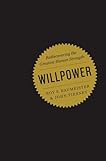 Willpower: Rediscovering the Greatest Human Strength by Roy F. Baumeister
Willpower: Rediscovering the Greatest Human Strength by Roy F. BaumeisterMy rating: 5 of 5 stars
I am a big fan of this book. The authors (one research psychologist and one science writer for the New York Times) start by describing the famous marshmallow experiment (kids who were able to resist eating a marshmallow were generally more successful in life) and say that willpower is one of the only traits that corresponds well to success (the other is IQ, which we don't really know how to improve).
Willpower is an idea that was very popular in the Victorian era, but in more recent times has fallen by the wayside. But a series of experiments have shown the following fascinating things:
- When you start the day, you have a finite amount of willpower, and it can be used up. Students who were told to eat radishes instead of freshly-baked chocolate chip cookies (and were left alone with the cookies for a while...what a cruel experiment!) were less persistent in a standard task (working on an impossible problem) than the students that were allowed to eat the cookies.
- Suppressing emotions (when watching a sad movie, for example) has a similar effect of draining willpower.
- But, eating food or raising your glucose level can replenish your willpower. Similarly, people who have used up their willpower show lower glucose levels.
Another random thing the book mentions - doing the Stroop task (saying the color that a word is printed in, rather than reading the word of a different color) for words in Russian was used during the Cold War to try to find covert agents who claimed to not speak Russian. If you don't know the language the words are printed in, the task isn't hard at all, but if you do you're generally slower. Nifty!
Making choices also drains willpower. Interestingly, it seems that weighing options and looking at pros and cons doesn't drain willpower nearly as much as the action of making a decision. When your willpower is low, you'll tend to take the recommended option, or decide on one dimension alone. ("Just give me the cheapest!")
To develop willpower in children, it's important to punish them when they do something wrong - the harshness of the punishment doesn't matter much, but consistency and the delay between the bad action and the punishment are very important.
There's also a chapter on dieting, which is very difficult because willpower is driven by glucose in your bloodstream! They did mention two interesting things:
- The "what the hell" effect is common in dieters, where if you've already gone over your calorie limit (or whatever) for the day, you'll tend to indulge more since you've already "failed". Of course, this is massively counterproductive.
- Seeing a treat and saying "no, I won't have this" is draining of willpower. But saying "I can have this, but later" doesn't drain it as much, and when "later" rolls around you're less likely to actually eat it.
Finally, some tips for increasing willpower: doing certain kinds of exercises can help. For example, reminding yourself to sit up straight, or recording everything you eat in a food diary have been shown to increase willpower stamina. The key point is that you're trying to change a habitual behavior. And it seems to be the case that you only have one type of willpower, so working on posture, for example, should help you resist other kinds of temptations better.
The book covers a bunch of different facets of willpower, and so it can feel a little disjointed from chapter to chapter, but I didn't mind since they were all pretty interesting. It also looks at some celebrity examples - David Blaine, for example, has tremendous willpower (when it comes to his stunts, anyway), and Drew Carey hired David Allen to personally come help him use the Getting Things Done system.
Some closing tips:
- Watch for the symptoms of "willpower depletion" - they're a little hard to spot, but a big one is "emotional volume". If your emotions are more intense than usual (e.g. being unnaturally upset at trivialities), that's a good sign to try to avoid making any binding decisions.
- If you're trying to make changes in your life, make them gradually, and don't try to do more than one at a time - you're more likely to fail at them all.
- When working on a goal, monitoring is very important, as is rewarding yourself when you reach milestones. There's an interesting mention of a group called the Quantified Self who are interested in automated monitoring of their body - pedometers, FitBit, and the like. Sounds right up my alley - I should check them out!
As I said, this is a very interesting book - I took notes and left around half of them out of this review because there was so much good stuff! I got a paper copy, so it's available for borrowing.
View all my reviews